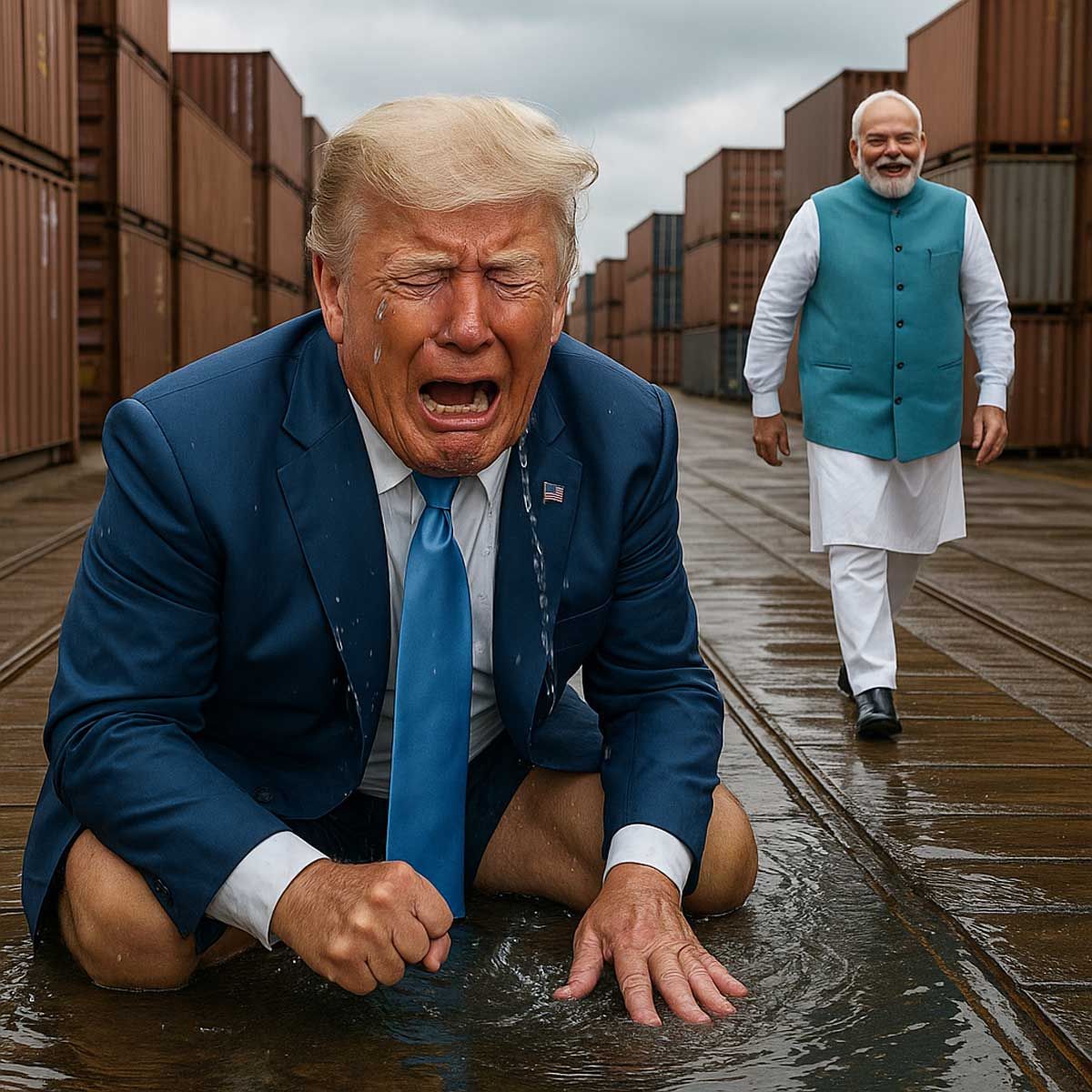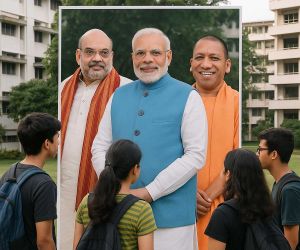MORE COVERAGE
Twitter Coverage
Satyaagrah
Written on
Satyaagrah
Written on
Satyaagrah
Written on
Satyaagrah
Written on
Satyaagrah
Written on
JOIN SATYAAGRAH SOCIAL MEDIA
Several countries including India, Japan, Australia, Taiwan, and Germany suspended parcel deliveries to the US after Trump ended the de minimis tariff exemption, disrupting global e-commerce, postal services, and millions of low-value shipments worldwide

Japan, Australia, and Taiwan have now joined the growing list of countries suspending parcel shipments to the United States. This development comes right after the Trump administration announced new trade rules ending tariff exemptions on small imports.
|
For decades, the U.S. allowed packages under a certain value to enter duty-free under the “de minimis” exemption. The threshold was set at $800, which meant millions of low-value parcels could move across borders without attracting customs duties. That era is now ending. President Donald Trump signed an executive order on 30th July, removing the exemption as part of his broader protectionist trade campaign. The order takes effect on 29th August.
The exemption had been a cornerstone of global e-commerce. It allowed buyers to shop online from foreign sellers with fewer costs, faster delivery times, and simpler paperwork. Now, without this benefit, millions of packages that once moved freely every day will face customs duties, additional forms, and possible delays. International delivery firms have already begun adjusting, and analysts warn that American consumers will be among the first to feel the effect through higher costs and slower deliveries.
Washington argues that this decision is necessary to curb the “flood of cheap imports” and shield U.S. manufacturers from unfair competition. However, what is being promoted domestically as an economic safeguard has created major disruptions abroad. Postal services and online platforms worldwide are reporting significant strain.
The order does make one concession: letters, documents, and gift items valued up to USD 100 will continue to remain duty-free.
|
Impact on Global Postal Services
Several countries had already moved earlier to restrict shipments to the U.S. Thailand, South Korea, New Zealand, France, and the UK had previously suspended certain parcel services. With more Asia-Pacific countries now joining them, the challenges for small businesses and individuals trying to send goods have increased dramatically.
In Europe, Germany’s DHL and Deutsche Post announced last week that they would halt parcel deliveries to the United States. They explained that there were still too many unanswered questions—such as how duties would be collected, what type of sender data would be required, and how information would be shared with U.S. Customs and Border Protection (CBP).
In Asia, postal services are following the same path. Japan Post confirmed that from 27th August, it will no longer deliver small packages worth more than $100 to the U.S. Likewise, Australia Post announced that from 26th August it will “partially suspend” deliveries to the U.S. and Puerto Rico until further notice. The company also highlighted that postal operators worldwide are taking similar steps, creating significant headaches for online sellers.
Taiwan’s Chunghwa Post also declared that from 26th August, it will stop delivering small parcels to the U.S.. According to the postal authority, the global system does not yet have a workable mechanism for senders to prepay customs duties, and with its partner carriers also suspending shipments, the service could no longer function smoothly.
According to a BBC report, at least 25 countries have now suspended parcel deliveries to the United States following the removal of the tariff exemption.
|
Who Will Be Affected the Most?
The hardest-hit will be online sellers and global platforms that depend on low-cost, cross-border shipping. Small businesses operating on platforms such as Amazon Haul, TikTok Shop, Etsy, and Shopify will face the biggest challenges. These services connect small-scale overseas sellers directly with American buyers, and their success largely depends on inexpensive international shipping.
Even established logistics companies are scaling back. DHL has said it will stop accepting shipments to the U.S. from 25th August, joining several European postal operators that have already withdrawn services.
Australian businesses are already reporting difficulties. ABC News noted that local retailers are struggling to adapt. Laz Smith, co-founder of maternity wear brand Apéro, described the situation as deeply troubling: “It puts us, and the entire Australian fashion industry, in a really tough position,” she said, underlining how instability and lack of quick solutions are hurting businesses.
|
India Post Joins the Suspension
India has also stepped into the growing list of nations halting U.S.-bound deliveries. On Saturday, 23rd August, the Department of Posts issued a statement announcing the temporary suspension of most international postal services to the United States, effective 25th August.
The move comes as a direct response to Trump’s 30th July executive order. India Post explained that starting 29th August, 2025, all goods sent to the U.S.—regardless of their value—would now attract customs duties under the International Emergency Economic Power Act (IEEPA) tariff system.
Air carriers handling U.S.-bound mail said they were unprepared to comply with the new requirements, which include duty collection and transmitting detailed sender and recipient data to CBP. As a result, India Post has suspended booking most categories of items to the U.S., though discussions with American authorities are ongoing to restore full operations.
While CBP released preliminary guidelines on 15th August, vital details—such as how “qualified parties” will be approved and how duties will be collected and remitted—are still pending. Customers who have already shipped unqualified goods will be eligible for refunds. “We apologise for the inconvenience,” India Post said, stressing that efforts are underway to resume services soon.
|
|
What the Data Shows
The numbers highlight the scale of the change. According to U.S. Customs and Border Protection, more than 1.36 billion de minimis shipments entered the country in the last fiscal year—an average of nearly 4 million packages processed every day.
Under the new executive order, importers could now face substantial fees. For exports from countries with a tariff rate below 16%, the fee will be $80 per item. For those between 16% and 25%, the fee doubles to $160 per item. For tariff rates above 25%, the cost spikes to $200 per item.
This sharp increase in cost means that sending even small parcels to the U.S. will become far more expensive. For many small and medium-sized businesses worldwide that depend on American customers, this represents a serious setback and may even force them to rethink their survival strategies.
 Support Us
Support Us
Satyagraha was born from the heart of our land, with an undying aim to unveil the true essence of Bharat. It seeks to illuminate the hidden tales of our valiant freedom fighters and the rich chronicles that haven't yet sung their complete melody in the mainstream.
While platforms like NDTV and 'The Wire' effortlessly garner funds under the banner of safeguarding democracy, we at Satyagraha walk a different path. Our strength and resonance come from you. In this journey to weave a stronger Bharat, every little contribution amplifies our voice. Let's come together, contribute as you can, and champion the true spirit of our nation.
 |  |  |
| ICICI Bank of Satyaagrah | Razorpay Bank of Satyaagrah | PayPal Bank of Satyaagrah - For International Payments |
If all above doesn't work, then try the LINK below:
Please share the article on other platforms
DISCLAIMER: The author is solely responsible for the views expressed in this article. The author carries the responsibility for citing and/or licensing of images utilized within the text. The website also frequently uses non-commercial images for representational purposes only in line with the article. We are not responsible for the authenticity of such images. If some images have a copyright issue, we request the person/entity to contact us at This email address is being protected from spambots. You need JavaScript enabled to view it. and we will take the necessary actions to resolve the issue.
Related Articles
- PM Modi schooled Trump with a masterclass in diplomacy—firmly denied any US role in the India-Pakistan ceasefire, rejected third-party mediation, exposed Congress’s global blunder, and proved that India won’t bow to gimmicks or play into PR-driven traps
- Trump’s tariff war backfires, pushing India and China closer as Xi Jinping’s secret letter to Droupadi Murmu sparks Modi’s renewed outreach to Beijing, with Jaishankar and Adani paving the way ahead of a high-stakes SCO summit in Tianjin
- US ramps up tariffs as Trump, Fitzpatrick and Graham push penalties over Russian oil, yet Modi and Jaishankar defy Washington, vowing India won’t bow to Western hegemony
- PM Modi’s Asia strategy with RCEP, Japan, and China shields India’s economy, while Donald Trump rages with futile tariffs and Navarro’s taunts, revealing Washington’s frustration as India charts its sovereign path beyond American pressure
- Tata Group officially takes over the airline from the union government, says we are committed to making it a world-class airline: ‘Golden age of Air India lies ahead’
- "In the seamless weave of history and innovation, lies the essence of timeless success": Selfie, hand-written letter, walk with PM, ‘Bhavishya ki Jhalkiyan’ and more: Pradhan Mantri Sangrahalaya generates ₹6 crore plus revenue in just 1 year, reveals RTI
- Donald Trump admits 50% tariffs hurt India and strained ties with Modi, yet urges G7 and China to follow, bragging of solving wars in a spectacle that mocks his own credibility
- PM Modi’s Japan visit on August 29, 2025, marks a turning point as Tokyo commits ¥10 trillion to India, deepening ties through bullet trains, chip projects, and defence cooperation, while both nations confront China’s aggression and US tariff wars
- Anthony Blinken delusional about US primacy over world affairs made schoolmasterish remarks, “US monitoring human rights abuses in India”: Lutyens elites and the editors of India’s English-language media outlets lap it up
- "In all chaos there is a cosmos, in all disorder a secret order": The Symphony of Governance, Architectural Marvel and Divine Geometry: Prime Minister Modi inaugurates the Sri Yantra-Inspired Majestic New Parliament amid chants of shlokas & sacred mantras
- "You cannot expect to get the effect when you neglect to create the cause": 73 years after his death it was Modi who finally brought back ashes of Shyamji Krishna Varma and his wife from Geneva as their last wish to be returned to an independent India
- "Share our similarities, celebrate our differences": India-Russia economic cooperation extended to payments domain hitting final nail in proverbial coffin of American Card companies, India accepts MIR, Russia accepts RuPay, VISA-MasterCard cry in agony
- Minimum age of women for marriage is raised to 21 years: Union Cabinet clears proposal
- "Chal gaya to chaand tak, nahi chala to sham tak": DoT tightenes telecom license conditions, mandating operators to use equipment only from vendors with ‘trusted sources’, approval for network expansion as well, besides upgradation
- "No ceasefire, no deal, no breakthrough—just talk": Trump-Putin summit in Alaska ends without progress on the Russia-Ukraine war, as Zelensky condemns Ukraine’s exclusion while Trump hails it “10/10” and claims peace now rests on Kyiv’s shoulders

























